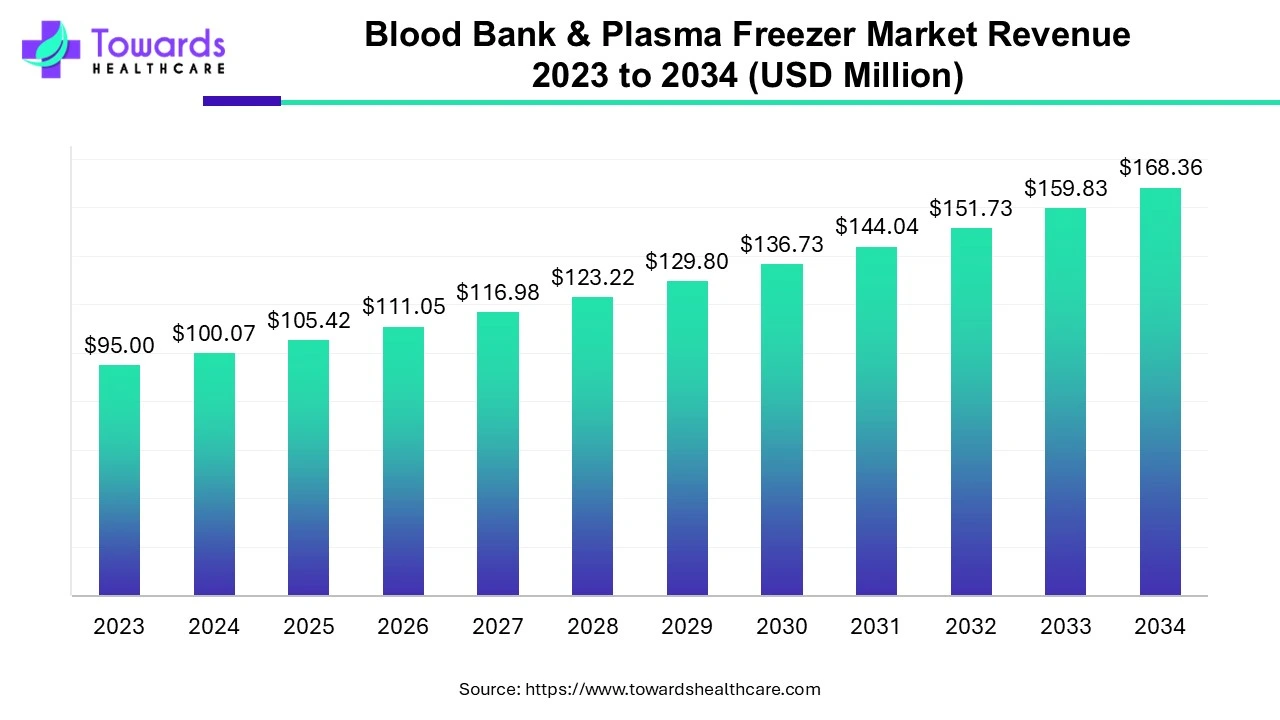January 2026

The global blood bank & plasma freezer market was estimated at US$ 95 million in 2023 and is projected to grow to US$ 168.36 million by 2034, rising at a compound annual growth rate (CAGR) of 5.34% from 2024 to 2034. The rising demand for blood banks & plasma freezers to ensure the safe storage of donated blood at a consistent freezing temperature which is further used for transfusion and other medical procedures is fuelling the market growth.

The hospitals and private blood banks have the responsibility to manage the bloodstock by maintaining an inventory for each group, ensuring the average age of blood at the time of issue, and monitoring the amount of outdated blood. Storing the blood and plasma at a maintained freezing temperature of -30 to - 40 °C provides the optimum environment for fresh frozen plasma, red cells, and platelet concentrates. The rising demand for blood and blood components for timely availability of blood at emergency healthcare facilities determines the patient's survival factor leading to the growth of the blood bank & plasma freezer market.
For Instance,
The increasing incidence of various diseases is promoting the production of vaccine serum and increasing the demand for blood is boosting the blood bank & plasma freezer market and is expected to expand in the foreseeable future. This technology is increasing the adoption of the market as it aids in collecting, storing, and distributing biological samples for treatment or scientific research purposes. It is anticipated to witness improved technical standards in the collection, conservation, and use of the samples. Along with this, enhancement in biobank networks which include public and private partnerships will boost the market growth.
Additionally, a smart monitoring system offers real-time tracking and alert systems in the blood and plasma storage facilities. These systems are built with IoT) Internet of Things) to monitor temperature, humidity, and other critical parameters. This advanced technology is expected to provide proactive management and early detection of storage conditions.
The high cost of purchasing and maintaining blood and plasma freezers is affecting the market growth. Installation of a freezer or refrigeration with advanced features can be a financial burden for small-scale hospitals, clinics, and blood banks. The affordability challenge faced by hospitals and blood banks is degrading the adoption of blood and plasma freezers which restrain the growth of the blood bank & plasma freezer market.
Organizations and institutions dominate the blood bank & plasma freezer market in North America.
North America dominated the global blood bank & plasma freezer market in 2023. The dominance in this region is due to the establishment of private and government organizations such as the American Association of Blood Banks (AABB), the Council of Community Blood Centres (CCBC), the American Blood Resource Association (ABRA) and other organizations. These major professional associations are involved in maintaining blood banks and transfusion medicine committees. Approximately 24,00 institutions (community, regional and American Red Cross blood centres, hospital blood banks and other hospital transfusion services) and 9,500 individuals are members of AABB.
Implementing Initiatives drive the Asia Pacific Market.
Asia Pacific is anticipated to grow at the fastest CAGR in the blood bank & plasma freezer market during the forecast period of 2024 to 2034. The region is growing due to its developing projects for biotechnology, life sciences and smart health. Collaborative initiative is witnessed in the region among hospitals, clinics, blood banks and organizations. Aisa Pacific Plasma Leaders Network (APPLN) emphasize the regional shortage of plasma-derived medicinal products in low and middle-income countries. Hence, provides a platform for experts to share expertise and attract multi-stakeholder collaborations.
By type, the -20° to -40° segment held the largest share of the blood bank & plasma freezer market in 2023. This is the ideal temperature of the freezer. The temperature range of the freezer is about 0 degrees and below. Freezers contain a good seal door leading to saving energy.
2° to 6° is expected to register the fastest growth in the blood bank & plasma freezer market during the forecast period of 2024 to 2034. This is the ideal temperature of the refrigerator. Compared to a freezer, a refrigerator consumes more electricity.
By application, the hospital segment held the largest share of the blood bank & plasma freezer market in 2023. The dominance of this segment is attributed to the collaboration of hospitals with blood banks. This nationwide partnership provides blood products, apheresis, laboratory services and transfusion medicine services. The intense local understanding of the communities, hospitals and patients in need is encouraged by this action.
The blood bank segment is expected to grow substantially during the predicted period. The reason behind the growth is the responsibility of collecting, storing, and distributing blood and blood components and blood and plasma-derived products to other blood establishments. The blood banks ensure quality system management and good practice governance through management.
By Type
By Application
By Region
January 2026
January 2026
January 2026
December 2025